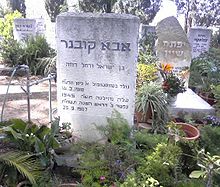Abba Kovner

Abba Kovner (also Abba Kowner ; born March 14, 1918 in Sevastopol , then Russia ; † September 25, 1987 in Kibbutz En HaChoresch , Israel ) was a Lithuanian-Israeli writer, partisan leader in World War II and founder of the Nakam organization .
Life


Abba Kovner grew up in Vilnius, now Vilnius in Lithuania , and was a member of the youth movement Haschomer Hazair as a teenager . His planned emigration to Palestine was thwarted by the outbreak of World War II. During the German occupation of Vilnius, Kovner stayed in the city, initially under the protection of Dominican women , including Cecylia Roszak (1908-2018), and later in the Vilnius ghetto . As one of the leaders of the Jewish resistance, Kovner took part in the armed uprising and published a manifesto calling on Jews not to be "led to the slaughter like sheep". In the forests around Vilna, he fought the German occupiers as commander of the Fareinigte Partisaner Organizatzije .
After the end of the war, Kovner was one of the founders of the Bricha underground movement and took part in helping hundreds of thousands of people from Eastern Europe to flee to Palestine. In the last months of the war he founded the terrorist organization Nakam (revenge). For a plan of revenge against the Germans for the Jews murdered in the Holocaust , he drove to Palestine in 1945 to obtain toxins and money to poison the drinking water of Nuremberg. However, when he attempted to return to Europe, he was intercepted by the British secret service and held for four months in a prison in Egypt. As part of the planned Kovner actions was then his deputy in the Nakam, Pasha Reichman (Yitzhak Avidov), a poison attack on prisoners of war, members of the SS at the detention center in Nuremberg-Langwasser put into effect, in which, although 2,000 inmates suffering from poisoned bread, but survived. The Nakam commands were then disbanded.
During his imprisonment in Egypt, Abba Kovner wrote the poem Ad lo or ("Until there is no more light", 1947). In the following years he published more books of poetry as well as prose - trilogy with memories of the Givati Brigade.
After his release from prison he became a member of Kibbutz En HaChoresh and fought as an officer in the Giv'ati Brigade since the beginning of the Israeli War of Independence . Kovner testified later in the Eichmann trial .
In 1946 he married Vitka Kempner , a comrade in the partisan fight , in 1948 their son Michael was born in Hadera .
In 1970 Abba Kovner was awarded the Israel Prize . He died in 1987 on the second day of the Jewish New Year and was buried in his kibbutz En haChoresh (in the Sharon Plain between Netanya and Hadera). The Israeli politician Meir Vilner was his cousin.
Works
Kovner's works have been printed in Yiddish , mainly in Hebrew and partly in English translation .
literature
- Encyclopaedia Judaica , Vol. 10, pp. 1229-1230.
- Rich Cohen: Night March . S. Fischer, Frankfurt am Main, 1999, ISBN 3-596-15240-2
- Dina Porat : The Fall of a Sparrow. The Life and Times of Abba Kovner. Translated and edited by Elizabeth Yuval. Stanford University Press, Stanford 2010, ISBN 978-0-8047-6248-9
- Tom Segev : The Seventh Million. The Holocaust and Israel's Politics of Remembrance . Rowohlt, Reinbek 1995, first in Hebrew 1991, ISBN 3-498-06244-1 , pp. 192–208.
- Jim G. Tobias, Peter Zinke: Nakam. Jewish revenge on Nazi perpetrators . Konkret Literaturverlag, Hamburg 1995, ISBN 3-89458-194-8 .
Web links
- Literature by and about Abba Kovner in the catalog of the German National Library
- Literature by and about Abba Kovner in the bibliographic database WorldCat
- Witnesses of the Eichmann Trial. (Video on YouTube, from minute 9:37 to minute 18:42) In: The Spielberg Jewish Film Archive. (Hebrew, English, testimony in the Eichmann trial ).
- Partisans of Vilna in the Internet Movie Database (English) (film by Joshua Waletzky, USA, 1986; Kovner plays himself).
Individual evidence
- ↑ Abba Kovner, Israeli Poet, Dies. In: The New York Times . September 27, 1987, accessed April 19, 2020 .
- ↑ Joachim Käppner: Why there were seldom acts of revenge after the Holocaust. In: sueddeutsche.de . July 2, 2019, accessed April 19, 2020 .
-
^ Michael Kovner: About Michael Kovner: Biography Notes. In: michaelkovner.com. Retrieved April 19, 2020 (English). Michael Kovner: About Michael Kovner: Illustrated Biography. In: michaelkovner.com. Retrieved April 19, 2020 (English).
- ^ Lesley Smith: The Partisans of Vilna (1986) - PopMatters Film Review. In: popmatters.com. May 11, 2005, accessed April 19, 2020 .
| personal data | |
|---|---|
| SURNAME | Kovner, Abba |
| BRIEF DESCRIPTION | Israeli writer and resistance fighter |
| DATE OF BIRTH | March 14, 1918 |
| PLACE OF BIRTH | Sevastopol |
| DATE OF DEATH | September 25, 1987 |
| Place of death | En haChoresch, Israel |
